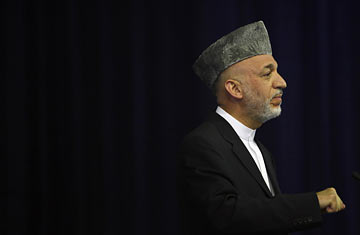
Afghanistan's President Hamid Karzai speaks at an election rally in Kabul on Aug. 13, 2009
Despite the impatience of his generals, President Barack Obama has good reason for taking his time over deciding whether to send more U.S. troops to Afghanistan. Right now, Washington's strategy is missing one key component: a legitimate Afghan President deemed worth defending.
Afghanistan's election commission, overseen by a U.N. watchdog body, has spent more than a month counting votes from the Aug. 20 election, trying to weed out the fraudulent ballots that may account for as much as 20% of the 5.5 million votes cast. When these tainted ballots are discounted, the front-runner and incumbent, President Hamid Karzai, may yet emerge as the first-round winner, even though his loyalists were the most brazen vote riggers. But if his tally falls below 50%, Karzai might be forced into a runoff against his former Foreign Minister, Dr. Abdullah Abdullah. U.N. officials are already rushing to print new ballots so that a run-off election could be held in early November. Afghans and international sponsors of the election agree that the only way to salvage its credibility is to see the process through, and possibly prosecute the fraudsters, whether or not Karzai squeaks by in the first round.
Until then, it is reasonable to expect that Obama will remain in "a holding pattern," as one Western diplomat in Kabul put it, postponing the decision whether to send reinforcements or overhaul his political and military strategy in Afghanistan.
The leadership crisis in Kabul casts a long shadow over plans to build up the Afghan military and police in order to allow the U.S. and its NATO allies to draw down troop levels. Foreign trainers admit privately that for the next few years, the Afghan security forces are woefully ill prepared to cope with the rising Taliban insurgency. For a monthly salary of $150, the loyalty of an Afghan cop will only go so far when his outpost at some bleak crossroads is ambushed by the Taliban. And while the Taliban forces are often highly motivated, there may not be that many Afghans willing to die to defend the Karzai government.
As things stand, Karzai will likely be confirmed as Afghanistan's President by November, muddied though he may by widespread election fraud. Washington must then decide: Is it worth backing a man who forfeited the trust of many Afghans and of the international community whom the harried President has tried to scapegoat for his government's corrupt incompetence?
The answer may be that Washington has no better alternative. Despite his growing paranoia — Karzai rarely leaves his presidential palace these days — and his failure to crack down on unsavory characters in his government (and perhaps in his own family), Karzai shouldn't be entirely written off. It is worth remembering a few of his assets: he is a Pashtun from the respected Popalzai tribe, credentials that may assist him in trying to negotiate with the predominantly Pashtun Taliban. (These recent elections reopened old schisms between the Pashtuns and the Tajiks, and if Abdullah, who is widely perceived as a Tajik leader, were to somehow win the runoff, the Taliban's ranks would almost certainly be swelled by masses of angry young Pashtuns.)
Karzai sought to ensure his re-election by making pacts with warlords whose human-rights records would have them behind bars in most countries. Still, having been installed in power by the U.S. invasion, Karzai has proven adept at persuading the country's umpteen warlords and trigger-happy commanders to usually — although not always — settle their grudges politically rather than with arms. Afghanistan may be a mess by the measure of politics and security, but its jails are no longer filled with thousands of political prisoners; in cities and towns, girls go to schools and universities; a feisty free press flourishes, and there are plenty of new millionaires whose fortunes were not necessarily made from trafficking opium, but from bricks and mortar, cell-phone towers and trade.
Obviously, none of this progress has been enough to stabilize the country. Otherwise, the Taliban wouldn't effectively control 60% of it, as some security analysts now claim. Every day, Karzai and his Western backers are losing ground to the Taliban, as insurgents fill the void created by the failure to bring progress to the rural areas. And as bad as Karzai's government of patronage may be, part of the blame for the lack of progress must also go to the international donors who concentrated on mega projects carried out by foreign corporations and their armies of gun-toting security contractors. Tapping into a seemingly limitless river of funds became an end in itself, rather than completing the actual bridge or road they were supposed to build.
More than additional U.S. troops, Afghanistan needs a leader who can deliver — and do it fast. Is Karzai able to be that leader? "Despite all the deal-making he's done to get elected, is it in his character to turn around and look at things in a gimlet-eyed [pragmatic] way?" asks one Western diplomat. Karzai's past record would say no. But lately, as he paces through his palace garden, with his bodyguards always in his shadow, he must have realized the extent to which the diplomatic community and his own people have forsaken him over the election debacle. As he tries to mend ties with the American public through a barrage of TV interviews, a more chastened, statesmanlike Karzai has emerged. It won't take long to discover whether this transformation is genuine or another piece of theater from the dapper Afghan President. For Obama, it may be worth the wait to find out.
